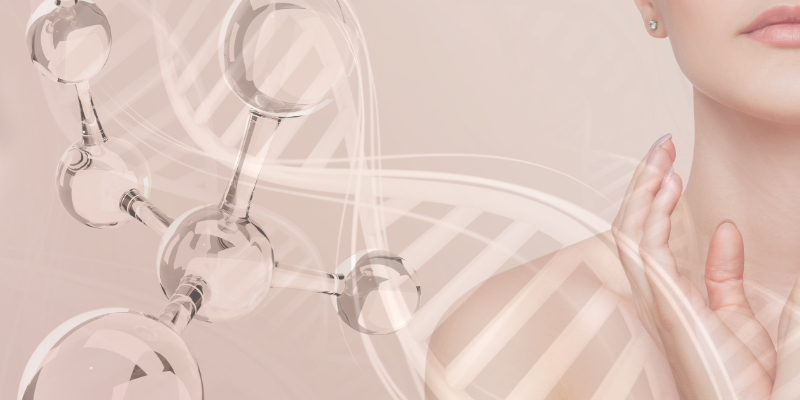Did you know that your diet can significantly affect the appearance and health of your skin? In a world where natural beauty and healthy skin are becoming increasingly desirable, discovering products that promote collagen production may be the key to looking younger and feeling better. Collagen, a protein responsible for skin's elasticity and firmness, plays a key role in preventing wrinkles and maintaining a healthy appearance. Unfortunately, its natural production decreases with age, leading to visible signs of aging.
Fortunately, there are many natural ways to help our body produce collagen. Here are 16 products that can help you keep your skin looking young and help your body as a whole:
Bone broth
Bone broth is prepared by long-term boiling of animal bones, which allows you to extract valuable nutrients from them, such as collagen, calcium, magnesium and glucosamine. The collagen found in bone broth is easily absorbed by the body, making it an excellent source of this protein. Regular consumption of bone broth can support joint health, improve skin elasticity, and strengthen bones. To get the maximum benefit, you should prepare the broth at home, using high-quality bones from a reliable supplier.
Chicken
Chicken meat, especially connective tissues, is rich in collagen. This is why many of the collagen supplements on the market come from chicken. Consuming chicken can provide the body with essential amino acids such as glycine and proline, which are crucial for collagen synthesis. Regularly including chicken in your diet can support skin health, improve elasticity, and reduce the appearance of wrinkles.
Fish
Fish are known for their high levels of collagen, especially in their skin and scales. Although fish meat contains less collagen, skin and scales are excellent sources of this protein. Consuming fish such as salmon, tuna, or mackerel can provide the body with not only collagen, but also valuable omega-3 fatty acids that support skin health and reduce inflammation. Therefore, it is worth including fish in your diet to help produce collagen.
Egg whites
Egg whites are rich in proline, one of the key amino acids needed for collagen production. Although eggs do not contain connective tissue, their proteins provide the body with the components necessary for the synthesis of collagen. Regular consumption of egg whites can support skin health, improve skin elasticity, and promote cell regeneration. Adding egg whites to your daily diet can be a simple and effective way to increase your body's collagen production.
Citrus fruits
Citrus fruits such as oranges, grapefruits, lemons, and limes are rich in vitamin C. Vitamin C is crucial for the production of procollagen, a precursor to collagen in the body. Regular consumption of citrus fruits supports healthy skin and helps fight wrinkles. You can add citrus fruits to salads, smoothies, or eat them raw.
Berry
Strawberries, raspberries, blueberries and blackberries are full of vitamin C and antioxidants. Vitamin C promotes the production of collagen, and antioxidants protect the skin from damage caused by free radicals. Eating berries can improve skin elasticity and slow down the aging process.
Tropical fruits
Mango, kiwi, pineapple and guava are full of vitamin C and contain a small amount of zinc, which promotes the production of collagen. Tropical fruits are a great addition to diets that support healthy skin by improving its elasticity and firmness. Add them to salads, smoothies, or eat them raw.
Garlic
Garlic contains sulfur, a mineral that promotes the synthesis of collagen and prevents its breakdown. Regular consumption of garlic can promote healthy skin and joints. Add garlic to dishes such as sauces, soups, or fried vegetables.
Green leafy vegetables
Spinach, kale, and chard contain chlorophyll, which has antioxidant properties and promotes collagen production. Chlorophyll helps protect the skin from damage and promotes cell regeneration. Add these vegetables to salads, smoothies, or as a side dish for dinner.
Beans
Beans are rich in protein and amino acids necessary for the production of collagen, as well as copper. Eating beans promotes healthy skin, improves its elasticity, and promotes tissue regeneration. Beans can be added to soups, salads, stews or as a side dish to main dishes.
Cashew nuts
Cashews contain zinc and copper, which contribute to the production of collagen in the body. Regular consumption of cashews can improve skin elasticity and support joint health. They can be eaten as an appetizer or added to salads and main courses.
Tomatoes
One medium-sized tomato provides about 30% of the daily requirement for vitamin C, as well as a large amount of lycopene, a powerful antioxidant. Lycopene helps protect the skin from damage and supports the production of collagen. Add tomatoes to salads, sauces, or eat them raw.
Pepper
Red pepper is rich in vitamin C and contains capsaicin, a compound with anti-inflammatory properties. Consuming pepper can promote collagen production and improve skin health. Pepper can be added to salads, soups, or main dishes.
Seed
Pumpkin, sunflower, flaxseed, and almond seeds contain zinc and copper, which are essential for the production of collagen. Regular consumption of the seeds can support skin health and improve its elasticity. Add the seeds to salads, yoghurts, or smoothies.
Fermented foods
Tempeh, yogurt, sauerkraut, and kombucha contain probiotics that can prevent the breakdown of collagen by reducing the production of free radicals. Eating fermented foods supports the health of the skin and digestive system. Add them to your daily diet to support collagen production.
Green Tea
Green tea contains EGCG, a flavonoid that helps protect the skin from UV damage and promotes collagen production. Regular consumption of green tea can improve the elasticity of the skin and promote its recovery. Drink green tea every day to enjoy its health benefits.
Why Diet Matters
Eating foods that are rich in collagen or promote its production can provide the body with the amino acids it needs to meet its skin health goals. Research shows that fruits and vegetables are the safest and healthiest approach to improving skin health. Additionally, collagen supplements may be less safe due to lack of regulation, so it's better to focus on your diet.
Resume
Understanding how diet affects collagen production is crucial for maintaining healthy and youthful skin. Including foods such as bone broth, chicken, fish, egg whites, citrus fruits, berries, tropical fruits, garlic, green leafy vegetables, beans, cashews, tomatoes, peppers, seeds, fermented foods, and green tea in your daily menu can significantly help the body's natural collagen production.
This will not only improve the elasticity and appearance of the skin, but also support the health of joints, bones and the general condition of the body. It's also important to avoid excess sugar and refined carbohydrates, which can damage your collagen. Remember that a healthy diet full of nutrients is the best way to keep your skin beautiful and healthy for years to come.
Integrating these foods into your daily diet is a step towards improving your health and well-being. Take care of your body from the inside out to enjoy the beauty from the outside.
FAQ about collagen on the skin
What is collagen and why is it important for the skin?
Collagen is a structural protein that is the main component of connective tissue in the body. This is crucial for maintaining skin's elasticity, firmness, and hydration. Collagen also helps in the regeneration of skin cells and prevents the appearance of wrinkles.
What are the main sources of dietary collagen?
The main sources of collagen are animal products such as bone broth, chicken, fish (especially their skin and scales), and egg whites. Plant-based foods do not contain collagen, but some of them, such as citrus fruits, berries, green leafy vegetables and cashews, support the production of collagen due to their content of vitamin C, zinc and copper.
Is collagen from food better absorbed than collagen supplements?
Collagen from food, especially bone broth, is bioavailable and easily absorbed by the body. Collagen supplements can be just as effective, but it is worth remembering that they are not as strictly regulated as food, which can affect their quality and effectiveness. It's always a good idea to consult your doctor before taking supplements.
What are the symptoms of collagen deficiency?
Symptoms of collagen deficiency can include loss of skin elasticity, wrinkles, dry and rough skin, joint weakness, joint and muscle pain, and slower wound healing.
Can diet significantly affect the level of collagen in the body?
Yes, diet has a huge impact on the level of collagen in the body. Eating foods that are rich in collagen or support its production (such as those rich in vitamin C, zinc, and copper) can help keep your skin healthy and supple. It is also extremely important to avoid excess sugar and refined carbohydrates, which can damage the collagen.
Are there any side effects from consuming collagen?
Collagen as a natural dietary ingredient is generally safe. However, if you take an excess or supplement, you may experience symptoms such as digestive problems, allergies, or skin reactions. Therefore, it is always a good idea to consult your doctor before starting taking collagen.
What other health benefits does collagen have?
In addition to improving skin health, collagen supports healthy joints, bones, hair, nails, and the digestive system. It can also promote faster muscle recovery after exercise and improve overall well-being.
What is the role of collagen in aesthetic medicine?
Collagen plays a key role in aesthetic medicine, because it is the main ingredient responsible for the structure, elasticity and hydration of the skin. Its application in this area includes:
- Skin fillers: Collagen is often used as a natural filler to smooth out wrinkles and facial lines, fill in nasolabial furrows and improve lip volume. Collagen treatments are popular for their immediate effects and natural appearance.
- Skin regeneration: Collagen is used in various regeneration procedures, such as microneedles, laser therapy, and chemical peels. This helps stimulate the body's natural production of collagen, which leads to improved skin texture, reduced scars, and reduced wrinkles.
- Scar treatment: Collagen is used to treat acne scars, surgical scars, and stretch marks. These treatments may include injecting collagen directly into the scars or applying collagen preparations to the surface of the skin.
- Anti-aging therapy: Collagen is a key ingredient in many anti-aging creams and serums. Its moisturizing and regenerating properties help to maintain a firm, supple skin and prevent the appearance of wrinkles.
- Tissue repair: In plastic surgery, collagen is used as a material for tissue reconstruction, especially in procedures involving soft tissue and skin repair. It can also be used as a carrier for other active substances that support the healing process.
- Hair and nail treatment: Collagen is also used in hair and nail strengthening treatments. Products containing collagen can improve hair structure, increase its volume, and prevent brittle nails.
Collagen is valued in aesthetic medicine for its natural biocompatible properties, minimal risk of allergic reactions, and ability to integrate into human tissues, making it a safe and effective solution in many cosmetic and therapeutic procedures.







